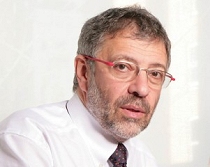Alexander Goldfarb (biologist): Difference between revisions
rv - nothing deflamatory about that. it is well-sourced and important info. |
rv - please do not place materials inconsistent with WP:NPOV policy to biographies of living persons |
||
| Line 15: | Line 15: | ||
From 1993 to 1997 he managed the [[Soros Foundation]] in Russia. He worked with [[Paul Farmer|Dr. Paul Farmer]] to battle [[tuberculosis]] in Russian prisons from 1997 to 2000. Since 2001 Goldfarb heads [[International Foundation for Civil Liberties]] established by [[Boris Berezovsky]] in New York. |
From 1993 to 1997 he managed the [[Soros Foundation]] in Russia. He worked with [[Paul Farmer|Dr. Paul Farmer]] to battle [[tuberculosis]] in Russian prisons from 1997 to 2000. Since 2001 Goldfarb heads [[International Foundation for Civil Liberties]] established by [[Boris Berezovsky]] in New York. |
||
Alexander Goldfarb first met [[Alexander Litvinenko]] during his tuberculosis studies in Russian prisons. He later helped Litvinenko to leave Russia. He was an unofficial spokesman for Litvinenko during the two last weeks of his life <ref>[http://www.guardian.co.uk/russia/article/0,,1955863,00.html Litvinenko poisoning: the main players], [[The Guardian]], 24 November 2006.</ref> |
Alexander Goldfarb first met [[Alexander Litvinenko]] during his tuberculosis studies in Russian prisons. He later helped Litvinenko to leave Russia. He was an unofficial spokesman for Litvinenko during the two last weeks of his life <ref>[http://www.guardian.co.uk/russia/article/0,,1955863,00.html Litvinenko poisoning: the main players], [[The Guardian]], 24 November 2006.</ref><ref>[http://www.independent.co.uk/news/world/europe/the-litvinenko-files-berezovsky-819532.html The Litvinenko files: Berezovsky], [[Mary Dejevsky]], [[The Independent]], May 2, 2008</ref> |
||
==Writings== |
==Writings== |
||
Revision as of 04:36, 12 April 2009

Alexander Goldfarb (born in 1947 in Moscow) is a Jewish-Russian-Israeli-American microbiologist, activist, and author.
Scientific career
Goldfarb studied biochemistry at the Moscow State University and graduated in 1969. After graduation, he worked in Kurchatov Research Institute of Nuclear Energy where he studied radiation damage of DNA [1]
He emigrated from the USSR in 1975 and lived in Israel where he received his Ph.D in 1980 from Weizmann Institute in Tel Aviv and in Germany, where he had his post-doctoral training in Max Planck Institute.[2].
In 1981-1991 he was an assistant professor at Columbia University in New York. Since 1992 he is a principal investigator at the Public Health Research Institute of New Jersey Medical School (PHRI).
Political activism and social work
Mr Goldfarb became known in the 1980s for his helping refuseniks to defect from the USSR while working at Columbia University in New York [3].
From 1993 to 1997 he managed the Soros Foundation in Russia. He worked with Dr. Paul Farmer to battle tuberculosis in Russian prisons from 1997 to 2000. Since 2001 Goldfarb heads International Foundation for Civil Liberties established by Boris Berezovsky in New York.
Alexander Goldfarb first met Alexander Litvinenko during his tuberculosis studies in Russian prisons. He later helped Litvinenko to leave Russia. He was an unofficial spokesman for Litvinenko during the two last weeks of his life [4][5]
Writings
Goldfarb helped Litvinenko to prepare his book Lubyanka Criminal Group for publication.[6] He later authored book "Death of a Dissident: The Poisoning of Alexander Litvinenko and the Return of the KGB" together with Marina Litvinenko.
References
- ^ Polonium in London (Russian), by Zhores Medvedev, "Worker of Krasnoyarsk", March 15, 2007
- ^ Alexander Goldfarb, Ph.D., a research summary and C.V., The Public Health Research Institute Center, New Jersey Medical School.
- ^ A Lethal Web of Spooks, Oligarchs and Spin], by Catherine Belton, The Moscow Times, 26 December 2006. Paid contents.
- ^ Litvinenko poisoning: the main players, The Guardian, 24 November 2006.
- ^ The Litvinenko files: Berezovsky, Mary Dejevsky, The Independent, May 2, 2008
- ^ A. Litvinenko and A. Goldfarb. Lubyanka Criminal Group Template:Ru icon GRANI, New York, 2002. ISBN 978-0-9723878-0-4.
His books
- Alex Goldfarb and Marina Litvinenko. Death of a Dissident: The Poisoning of Alexander Litvinenko and the Return of the KGB. Free Press, New York, 2007. ISBN 978-1416551652.
Links
Books mentioning Goldfarb
- Pathologies of Power: Health, Human Rights, and the New War on the Poor, Berkeley: University of California Press, 2003, 2005 edition: ISBN 0-520-24326-9
- Tracy Kidder, Mountains Beyond Mountains: The Quest of Dr. Paul Farmer, a Man Who Would Cure the World, Random House, 2003 hardcover: ISBN 0-375-50616-0, 2004 paperback: ISBN 0-8129-7301-1
